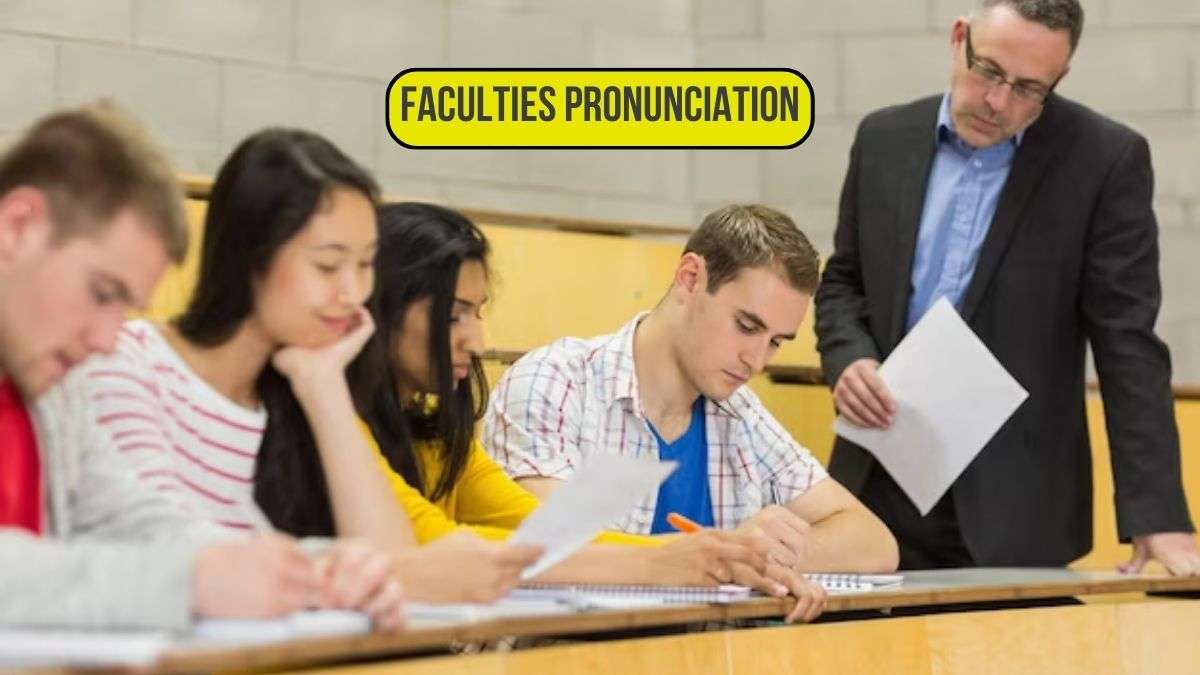Effective communication is the cornerstone of successful academia, and faculties pronunciation plays a pivotal role in ensuring clear and precise expression. The ability of faculties to articulate words accurately not only impacts their professional credibility but also significantly influences the learning experience of students.
Why Faculties Pronunciation Matters
Impact on Professional Credibility
Faculty members are often regarded as authorities in their fields, and the way they pronounce words contributes to their overall credibility. Clear pronunciation instills confidence among students and enhances the trust they place in their educators.
Enhancing Clarity in Academic Settings
In academic environments, where complex concepts are discussed, clarity is paramount. Proper pronunciation ensures that students can understand and grasp the subject matter without confusion or ambiguity.
Building Confidence Among Students
Faculty members who demonstrate mastery over pronunciation inspire confidence in their students. This confidence is not only crucial for understanding lectures but also for fostering a positive and empowering learning atmosphere.
Common Challenges in Faculties Pronunciation
Accents and Their Influence
Accents, while diverse and culturally rich, can pose challenges in communication. Faculty members may face difficulties being understood due to regional or foreign accents, requiring conscious efforts to mitigate potential misunderstandings.
Mispronunciations and Their Consequences
Mispronunciations, whether subtle or significant, can lead to misconceptions and misinterpretations. Faculty members must be aware of common pronunciation pitfalls to maintain effective communication.
Overcoming Language Barriers
For international faculty, language barriers can be a hurdle in effective communication. Strategies to overcome these barriers are essential to ensure inclusive and accessible education.
The Connection Between Pronunciation and Understanding
How Mispronunciations Can Lead to Misunderstandings
Mispronounced words can result in misunderstandings, impacting the overall comprehension of the subject matter. Faculty members need to recognize the correlation between pronunciation and effective understanding.
Importance of Clear Pronunciation in Educational Contexts
In educational settings, where the dissemination of knowledge is paramount, clear pronunciation becomes a cornerstone for successful teaching. It fosters an environment where students can absorb information accurately.
Strategies for Improving Faculties Pronunciation
Speech Therapy Options
For faculty members facing persistent pronunciation challenges, seeking professional help through speech therapy can be an effective solution. These tailored programs address specific pronunciation issues and enhance overall speech clarity.
Utilizing Pronunciation Apps and Tools
In the digital age, numerous apps and tools are designed to improve pronunciation. Faculty members can integrate these resources into their routine for convenient and personalized language enhancement.
Engaging in Language Workshops
Participating in language workshops provides a collaborative learning environment where faculty members can hone their pronunciation skills. Workshops also foster a sense of community among educators striving for improvement.
Benefits of Investing in Pronunciation Improvement
Improved Student-Teacher Communication
Clear pronunciation facilitates seamless communication between faculty and students. This, in turn, leads to enhanced engagement, active participation, and a more enriching learning experience.
Positive Impact on Student Learning Outcomes
Research indicates that faculty members with strong pronunciation skills positively influence student learning outcomes. Students are more likely to excel when they can clearly understand and absorb the material presented.
Career Advancement for Faculty Members
Proficiency in pronunciation contributes to a faculty member’s professional development. It opens doors to opportunities for conferences, publications, and collaborations, ultimately advancing their careers in academia.
Real-life Examples of Pronunciation Success Stories
Stories of Faculty Members Overcoming Pronunciation Challenges
Inspiring stories of faculty members overcoming pronunciation challenges showcase the transformative power of dedication and improvement. These examples motivate others to embark on their pronunciation enhancement journey.
The Positive Impact on Their Professional Lives
Faculty members who invest in pronunciation improvement often witness a positive transformation in their professional lives. From increased confidence to broader career prospects, the benefits extend far beyond the realm of speech.
Technological Advances in Pronunciation Enhancement
AI-Driven Pronunciation Tools
Artificial intelligence has revolutionized language learning, offering advanced pronunciation tools that provide real-time feedback. These tools analyze speech patterns and offer personalized recommendations for improvement.
Virtual Reality Applications for Language Improvement
Virtual reality applications immerse faculty members in simulated environments where they can practice and refine their pronunciation. This innovative approach enhances the learning experience and accelerates skill development.
Online Resources and Courses
The internet offers a wealth of online resources and courses dedicated to pronunciation improvement. Faculty members can access these resources at their convenience, tailoring their learning journey to suit their specific needs.
Cultural Sensitivity and Pronunciation
The Role of Cultural Awareness in Pronunciation
Cultural sensitivity is integral to pronunciation, as it involves recognizing and respecting diverse linguistic backgrounds. Faculty members should be mindful of cultural nuances to foster an inclusive and welcoming educational environment.
Avoiding Stereotypes Related to Accents
Stereotypes related to accents can perpetuate biases. Educators must actively work to dispel such stereotypes, promoting an atmosphere where diverse accents are celebrated and valued.
Creating an Inclusive Learning Environment
Prioritizing cultural sensitivity in pronunciation not only improves communication but also contributes to creating an inclusive learning environment. This inclusivity is vital for the success and well-being of all students.
Measuring and Assessing Pronunciation Skills
Tools for Self-Assessment
Faculty members can utilize self-assessment tools to gauge their pronunciation skills. These tools often provide valuable insights into areas that require improvement, empowering educators to take targeted action.
Incorporating Pronunciation Assessments in Academic Institutions
Incorporating pronunciation assessments into academic institutions ensures a standardized approach to evaluating faculty members’ language proficiency. This formal recognition encourages continuous improvement.
Continuous Improvement Strategies
Pronunciation improvement is an ongoing process. Faculty members should adopt continuous improvement strategies, such as regular feedback sessions, to stay proactive in refining their pronunciation skills.
Incorporating Pronunciation in Teacher Training Programs
The Need for Pronunciation Training in Teacher Education
Teacher training programs should recognize the importance of pronunciation and incorporate dedicated modules in their curriculum. This prepares future educators to communicate effectively and sets a high standard for teaching practices.
Integrating Pronunciation Modules in Curriculum Development
In curriculum development, pronunciation modules should be integrated to ensure that language proficiency is considered a fundamental aspect of teaching expertise. This holistic approach benefits both educators and students.
Addressing Student Concerns About Faculty Pronunciation
Open Communication Channels
Creating open channels for communication between faculty and students fosters an environment where concerns about pronunciation can be addressed constructively. This openness builds trust and understanding.
Encouraging Constructive Feedback
Encouraging students to provide constructive feedback on pronunciation promotes a collaborative learning atmosphere. Faculty members can use this feedback to tailor their improvement efforts.
Creating a Supportive Learning Environment
A supportive learning environment, where students feel comfortable expressing concerns, is crucial for addressing pronunciation issues. Faculty members play a key role in cultivating such an atmosphere.
Future Trends in Faculties Pronunciation Education
Emerging Technologies
As technology continues to evolve, new tools and methods for pronunciation education will emerge. Faculty members should stay informed about these advancements to remain at the forefront of language proficiency.
Evolving Teaching Methodologies
Teaching methodologies will adapt to incorporate the latest research and best practices in pronunciation education. Faculty members should be flexible in embracing new approaches to enhance their teaching effectiveness.
The Future Landscape of Pronunciation Education
The future of pronunciation education holds exciting possibilities. From virtual reality classrooms to AI-driven language labs, the landscape will continue to evolve, offering innovative solutions for faculty members.
Conclusion
In conclusion, faculties pronunciation is a crucial aspect of academic excellence. It impacts professional credibility, student learning outcomes, and the overall quality of education. By recognizing the significance of pronunciation and actively seeking improvement, faculty members contribute to a more enriching and inclusive educational experience.
FAQs
What impact does faculty pronunciation have on students?
Faculty pronunciation directly influences student understanding, engagement, and overall learning outcomes.
Are there any quick fixes for improving pronunciation?
Quick fixes may include pronunciation apps, speech therapy, and participation in language workshops, but continuous effort is key.
How can technology assist in pronunciation improvement?
Technology offers AI-driven tools, virtual reality applications, and online resources for personalized and effective pronunciation enhancement.
Is pronunciation equally important for all subjects?
Yes, clear pronunciation is essential for effective communication in all subjects, fostering a positive learning environment.
How can cultural sensitivity be incorporated into pronunciation training?
Cultural sensitivity involves recognizing diverse linguistic backgrounds and avoiding stereotypes related to accents, contributing to an inclusive learning environment.
Read More: Techburneh.com











I truly appreciate your technique of writing a blog. I added it to my bookmark site list and will